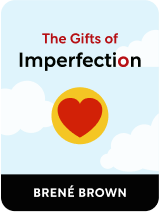

This article is an excerpt from the Shortform book guide to "The Gifts of Imperfection" by Brené Brown. Shortform has the world's best summaries and analyses of books you should be reading.
Like this article? Sign up for a free trial here .
Are you looking for the best The Gifts of Imperfection quotes from Brené Brown? Are you trying to live a Wholehearted life?
In her book The Gifts of Imperfection, Brené Brown discusses the concept of Wholehearted living. She says that in order to feel happier, reduce anxiety, and be healthier, the first step is to allow yourself to feel worthy.
Keep reading for some of the best The Gifts of Imperfection quotes.
The Gifts of Imperfection Quotes
In The Gifts of Imperfection, Brené Brown explores the theory behind living Wholeheartedly, as well as ten practical steps you can take to invite Wholeheartedness and worthiness into your life. Learn about how practicing courage, compassion, and connection can develop your worthiness; how shame affects your self-worth; and how finding time to play and rest will help you to live Wholeheartedly.
Below are some of the best The Gifts of Imperfection quotes from Brené Brown:
“Wholehearted living is about engaging with our lives from a place of worthiness. It means cultivating the courage, compassion and connection to wake up in the morning and think, ‘No matter what gets done and how much is left undone, I am enough.’ It’s going to bed at night thinking, ‘Yes, I am imperfect and vulnerable and sometimes afraid, but that doesn’t change the truth that I am also brave and worthy of love and belonging.”
In The Gifts of Imperfection, Brené Brown explores the concept of “Wholehearted living.” This way of life is all about cultivating the feeling of worthiness. It’s about accepting that you’re flawed, but recognizing that this doesn’t impact your worth as a person.
Brown claims that living Wholeheartedly has improved her life in many ways. She feels less anxious; happier; healthier, both physically and emotionally; and more accepting of herself.
“Understanding the difference between healthy striving and perfectionism is critical to laying down the shield and picking up your life. Research shows that perfectionism hampers success. In fact, it’s often the path to depression, anxiety, addiction, and life paralysis.”
Brown’s second guidepost for living Wholeheartedly is fighting perfectionism. You may see perfectionism as a form of healthy self-improvement. It’s often framed as “trying to be the best version of yourself.” However, perfectionism is really about trying to control people’s perceptions of you. It’s an attempt to gain approval and acceptance from others by hiding your flaws and projecting the image of being perfect.
“We cannot selectively numb emotions, when we numb the painful emotions, we also numb the positive emotions.”
The third element of building resilience is refusing to numb negative emotions. Numbing is a common response to feelings such as disappointment, fear, sadness, and shame. You’re afraid of feeling these emotions, so you try to “take the edge off” them. You might do this by drinking alcohol, using drugs, binge eating, or shopping. If your need to dull your emotions becomes chronic and compulsive, you may even become addicted to your chosen coping mechanism.
The problem with this approach is that you can’t choose which emotions to numb. Numbing leads to all of your feelings being dulled—both positive and negative. You become unable to fully feel emotions such as joy, love, and excitement.
“Shame works like the zoom lens on a camera. When we are feeling shame, the camera is zoomed in tight and all we see is our flawed selves, alone and struggling.”
Shame prevents worthiness from developing because it’s completely antithetical to everything worthiness represents. It’s built on foundations of fear, self-hatred, and the sense that you’re not “enough.” Worthiness simply can’t flourish if you think this way.
Likewise, shame encourages you to reject and hide parts of yourself that you think others will judge or dislike—for example, your flaws and your failures. It convinces you that people won’t like your flawed and complex true self. It also tells you that if you admit to your flaws, people will no longer be able to see all of the positive things about you. Instead, they’ll become overly focused on the bad. Therefore, you should hide your flaws at all costs.
“Spirituality is recognizing and celebrating that we are all inextricably connected to each other by a power greater than all of us, and that our connection to that power and to one another is grounded in love and compassion. Practicing spirituality brings a sense of perspective, meaning and purpose to our lives.”
The final element of cultivating resilience is embracing spirituality. Brown defines spirituality as recognizing the existence of a higher power that connects us all. This connection with others is rooted in love and compassion, as is your connection with your higher power. Therefore, embracing the existence of a higher power opens the door to more love and compassion manifesting in your life. The “higher power” in this equation could be a religious power, such a god, but, it doesn’t have to be. It could be nature, or “the universe.”
“Here’s what is truly at the heart of wholeheartedness: Worthy now, not if, not when, we’re worthy of love and belonging now. Right this minute. As is.”
Brown’s research suggests that people can’t feel loved or like they belong unless they feel that they deserve love and belonging. In short, unless you cultivate worthiness, you’ll never fully experience love or belonging—and you’ll suffer accordingly. Love and belonging are innate human needs. If you don’t fulfill these needs, you’ll struggle emotionally and physically.

———End of Preview———
Like what you just read? Read the rest of the world's best book summary and analysis of Brené Brown's "The Gifts of Imperfection" at Shortform .
Here's what you'll find in our full The Gifts of Imperfection summary :
- How to stop feeling like you're not "good enough"
- How shame affects your self-worth
- The 10 guideposts to living Wholeheartedly and cultivating worthiness






